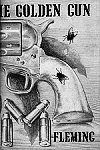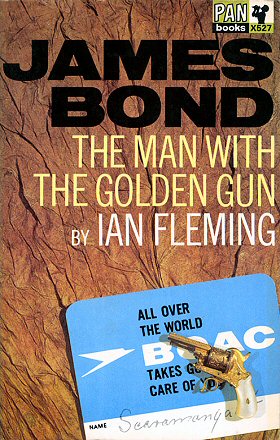 |
| |
MI6 looks back to 1965 at the critical reception
of Ian Fleming's posthumous James Bond novel "The
Man
With The Golden Gun"...
|
|
Out With A Whimper
17th February 2009
|
When James Bond creator Ian
Fleming died on August 12th 1964, readers of his
adventures may have feared it was also the end of the
line for 007. But there were still two titles in the
tank. Fleming's last full-length novel, "The
Man With The Golden Gun", was published posthumously
in 1965 by Jonathan Cape in the UK and by The New American
Library in the USA.
Topping the well-received "You
Only Live Twice" would prove an impossible task
for Fleming, who was suffering ill-health at the time
he penned his 'unlucky' 13th Bond title "Golden
Gun". So drastic was the drop in quality of plot
and writing that many believed that one-time Bond continuation
author Kingsley Amis ("Colonel
Sun") was brought in to touch-up the manuscript
prior to publication. Although Amis did recommend certain
changes, they were never actioned and he never worked
on the novel. A detailed account of his involvement can
be read in the Titan
Books edition of the "Colonel Sun" comic
strip compilation.
"Golden Gun" did elicit some praise, but most
of the critics in 1965 had their knives out for 007 after
his creator's passing. Most were unimpressed with the novel’s
villain, the golden gun-toting Scaramanga, especially when
compared to Bond’s previous foes. |
|

Above: 1st edition Jonathan Cape hardback (UK). Artwork
by Richard Chopping.
|
Universally, critics admitted that
the novel contained less excitement, sex, and blood than previous
novels. “This
book is never boring,” stated Simon Raven of The Spectator. “It
includes an imaginative cabaret, instructions of how to prepare
and eat a raw snake, and some amusing business with an old-fashioned
virgin tied to a railway line.”
|

Above: British Pan paperback 1st
edition (1966)
|
|
Almost all reviewers acknowledged the novel’s shortcomings. “Construction
is patchy and both sides get away with incompetence which
would have been unthinkable or immediately fatal a few
years earlier in Bond’s career,” said Raven.
The New Yorker wrote, “There is little else here
to recall those earlier days. There is no cheerful fornication,
no breathless chemin de fer, no gourmet meals, no joyous
drinking, no extraordinary physical exertions, and only
the merest dribble of spilled blood.”
Anthony Boucher of the New York Times Book Review claimed “this
posthumous story contains no imaginative criminal plot,
no worthy Bond-antagonist, and not even a Bond-girl.” Kingsley
Amis, normally a Bond supporter, also blasted the novel,
calling it “a sadly empty tale” with a thin
main plot with violence and sex at a minimum. Finally,
the Christian Century seemed joyous at Fleming’s
death and the end of the Bond line: “We’re
spoilsports, kill-joys and affirmers of life,” it
stated.
Despite the critical reception, 95,134 hardback copies
were sold in the USA in 1965 alone. A serious total made
more impressive by the book's presence on the bestseller
list for 15 weeks of that year, peaking at number 6 in
the chart. |
Review Snippets From 1965
"The James Bond Adventure always has invited comparison to sex:
When it's good, it's great; when it's bad, it's still pretty
good. But "The Man With the Golden Gun" is simply awful." --
Chicago Tribune
"Bedside lamps will be burning late tonight in London. All manner
of men--and probably a few women, too--will be savoring a pleasure
which can never come again. Ian Fleming's last James Bond adventure, "The
Man With the Golden Gun," will be the reason." --
The Washington Post
"Fleming comes on with the usual unusual opening, which has
nothing much to do with what follows. It just seems irresistible
to have a brainwashed Bond attempt to execute M. This is 007's
first understandable failure to complete an assignment. But after
that, there is the reliable villain with the strange name, Scaramanga,
a master assassin who uses only a golden gun, believes in sexual
intercourse before every murder, and has "a third nipple
two inches below his left breast." There is the girl. Since
there have already been twelve books, and since he never beds
with the same type twice, 007 has to fall back on his previously
unattainable secretary, Mary Goodnight. It may have been just
as well that Fleming died when everybody still thought he could
do no wrong." -- Time Magazine
"Perhaps Ian Fleming was tired when he wrote it. Perhaps
- his publishers didn't tell us -he left it unrevised. The fact
remains that this posthumous Bond is a sadly substandard job." --
The Observer
"James Bond should have a better exit. Sadly, The Man
with The Golden Gun ends not with a bang but a whimper. The
world will be a vastly more lacklustre and complicated place
with 007 gone." -- Newsweek
Related Articles
 The
Man With The Golden Gun - Literary Coverage
The
Man With The Golden Gun - Literary Coverage